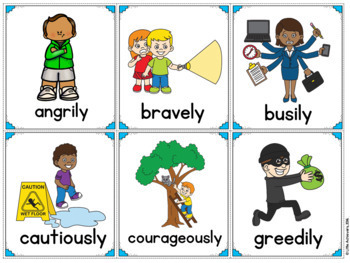Adverbs of manner are used to describe how things happen. They are usually put after the verb.



- The children are laughing happily.
- The girl is crying loudly.
- Liza dresses elegantly.
How to form adverbs of manner
Regular adverbs
Adverbs of manner are usually formed by adding ‘-ly’ to the adjective:
- careful → You should drive carefully at night.
- polite → Mary looks sad. Could you ask her politely, what has happened to her?
- serious → Seriously speaking, I don’t like this idea.
1. If the adjective ends in ‘-le’, remove ‘-e’ and add ‘-y’:
- gentle → This mechanism should be cleaned very gently.
- terrible → I will miss you terribly.
2. If the adjective ends in a consonant + ‘-y’, change ‘-y’ to ‘-ily’:
- angry → She looked at me angrily.
- easy → Jack can do grammar exercises easily.
- noisy → Your old printer works noisily, you should change it for a new one.
3. If the adjective ends in ‘-ful’, double the ‘-l’ and add ‘-y’:
- beautiful → Mary has cooked the meat beautifully.
- successful → Not all students passed their exams successfully.
Irregular adverbs
Some adverbs of manner are not formed by adding ‘-ly’:
1. ‘Well’ is the adverb of ‘good’. We often use ‘very’ and ‘quite’ with ‘well’:
- Jane speaks German and French very well.
- Nick runs long distances quite well.
2. Some adjectives ending in ‘-ly’, like ‘friendly’, ‘lovely’, ‘silly’, ‘ugly’, don’t change to become adverbs.
- He spoke to me in a friendly manner. (NOT:
He spoke to me friendlyly) - Her dancing is so lovely. (NOT:
She dances so lovelyly).
3. Adverbs of manner, like ‘early’, ‘late’, ‘fast’, ‘hard’, ‘low’, have the same form as their adjectives:
- The bus is late again (adjective).
- A am afraid, we’ll arrive late (adv).
- Tom drives very fast, it’s dangerous.
- We’re working hard all day long.
| Note: An adverb of manner should NOT be put between a verb and an object: |
| – He plays football perfectly. NOT: |
Watch this short video from Top English to learn more about adverbs of degree:
Read more about adverbs: